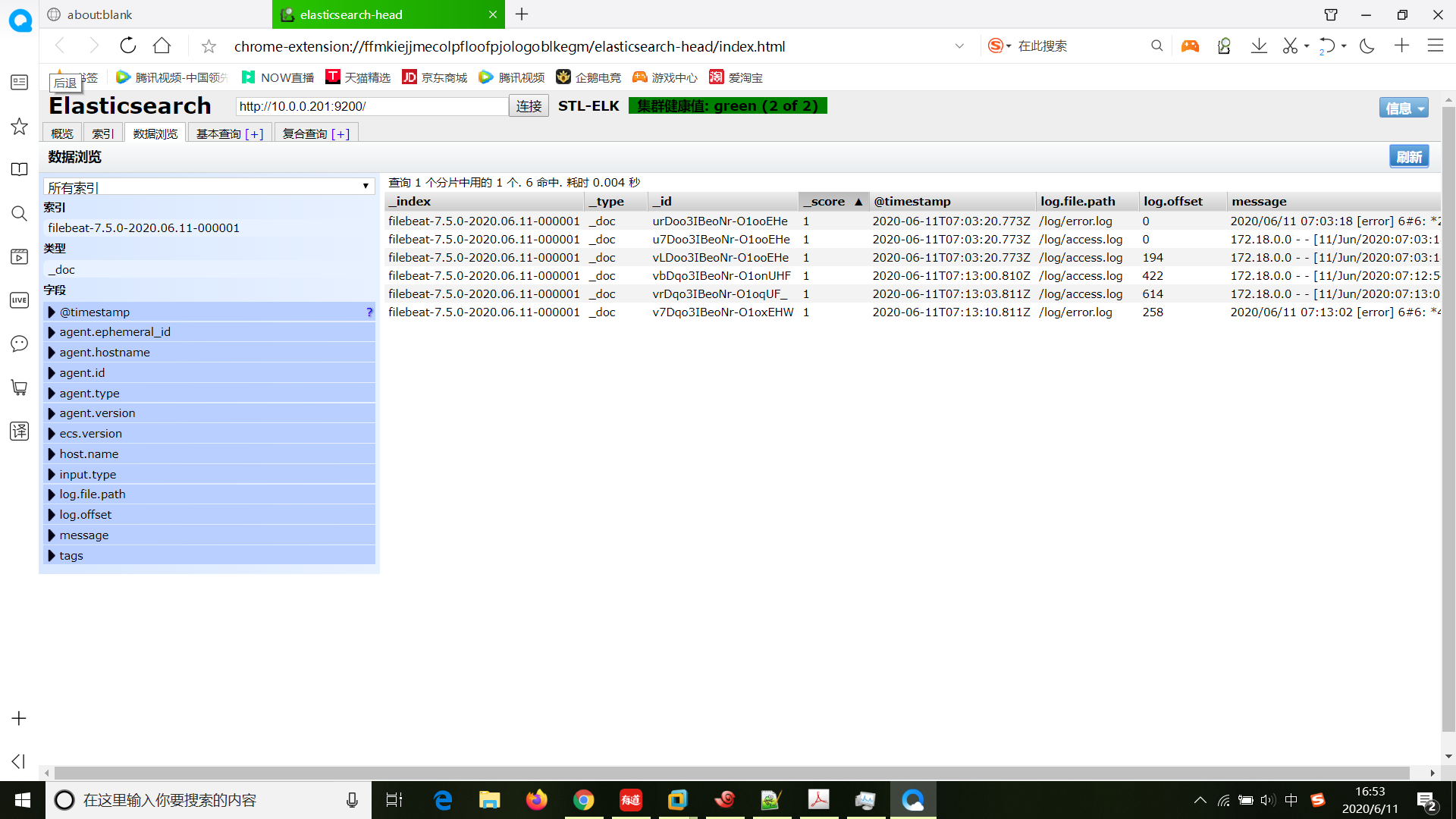k8s 部署filebeat sidecar模式
2020-06-12
小试牛刀:
先在自己本地wmware上尝试k8s中日志的收集方式。一般有两种方式:
一:sidecar模式,就是一个pod中部署两个容器,一个跑应用,一个采集日志,用emptdir的共享目录形式。
缺点:一个应用一个收集日志的容器,后期的话资源消耗是个问题。
二:节点模式,一个节点跑一个agent来采集标准输出和标准错误输出的日志,然后发送给后端。(标准日志:容器内输出到/dev/std...,或tail -f ,默认会存储在节点的/var/lib/docker/containers/...路径下,kubectl logs 能看到的日志就是标准日志。集群系统的日志一般在/var/log/containers/下。)详情网上查阅资料,这个只是简单的一个说法,并不严谨。
先尝试第一个模式: sidecar模式
一:创建filebeat的dockerfile,这里我用了centos,做好后镜像大约300+M,先尝试看看问题,后期换个基础镜像。
FROM centos:latest WORKDIR /usr/local ADD filebeat-7.5.0-linux-x86_64.tar.gz . RUN ln -s filebeat-7.5.0-linux-x86_64 filebeat \ && cd filebeat \ && mkdir config \ && chmod +x filebeat \ && cp filebeat.yml config/ ENTRYPOINT ["/usr/local/filebeat/filebeat","-c","/usr/local/filebeat/config/filebeat.yml"]
直接构建镜像,并推送到私有仓库
docker build -t 10.0.0.200:5000/centos-fb:v4 .
docker push 10.0.0.200:5000/centos-fb:v4
可以docker run运行看一下是否正常
二:创建一个deploymen资源,包含两个容器
[root@k8s-master ~/software]# cat nginx-filebeat-sidecar.yaml apiVersion: apps/v1 kind: Deployment metadata: name: nginx-fb namespace: sidecar spec: replicas: 1 selector: matchLabels: app: nginx-fb template: metadata: namespace: sidecar labels: app: nginx-fb spec: containers: - image: nginx:alpine name: nginx ports: - containerPort: 80 volumeMounts: - name: applog mountPath: /var/log/nginx - image: 10.0.0.210:5000/centos-fb:v4 name: filebeat volumeMounts: - name: applog mountPath: /log - name: filebeat-config mountPath: /usr/local/filebeat/config/ volumes: - name: applog emptyDir: {} - name: filebeat-config configMap: name: filebeat-config
三:创建好yaml总的namespace和configmap
namespace,metadata里只填写name就可以
[root@k8s-master ~/software]# kubectl get namespaces sidecar -o yaml apiVersion: v1 kind: Namespace metadata: creationTimestamp: "2020-06-10T09:38:02Z" name: sidecar resourceVersion: "669711" selfLink: /api/v1/namespaces/sidecar uid: 5b4d0ecc-ff6a-4b62-a41f-a9924efa4e0a spec: finalizers: - kubernetes status: phase: Active
configmap:以命令行的方式创建的,看一下filebeat的配置文件,配置文件有些问题,并不标准,下期更新一下
kubectl create configmap filebeat-config --from-file=filebeat.yml --namespace=sidecar #configmap名字要和上面deployment资源中引用的configmap名字相同,均标了红色。
[root@k8s-master ~/software]# cat filebeat.yml filebeat.inputs: - type: log enabled: true paths: - /log/access.log json.keys_under_root: true json.overwrite_keys: true tags: ["access"] - type: log enabled: true paths: - /log/error.log tags: ["error"] output.elasticsearch: hosts: ["10.0.0.200:9200"] indices: - index: "nginx_access-%{[beat.version]}-%{+yyyy.MM}" when.contains: tags: "access" - index: "nginx_error-%{[beat.version]}-%{+yyyy.MM}" when.contains: tags: "error" setup.template.name: "nginx" setup.template.pattern: "nginx_*" setup.template.enabled: false setup.template.overwrite: true
四:创建service资源,让nginx可以被外部访问
[root@k8s-master ~/software]# cat service-nginx.yaml apiVersion: v1 kind: Service metadata: name: service-nginx namespace: sidecar spec: type: NodePort ports: - port: 80 protocol: TCP targetPort: 80 nodePort: 30080 selector: app: nginx-fb
五:3和4 直接启动 kubectl creat -f
nginx 在浏览器中可以正常访问

ES还并没有部署在k8s中,在虚拟机中,从filebeat的配置文件可以看出来,可以正常看到两类日志,没有问题。
细心的朋友可能看出来了,Index没有按照filebeat的配置规则来,但是不影响今天的实验。

posted on 2020-06-12 17:24 也无风雨也无qing 阅读(6461) 评论(0) 收藏 举报



 浙公网安备 33010602011771号
浙公网安备 33010602011771号